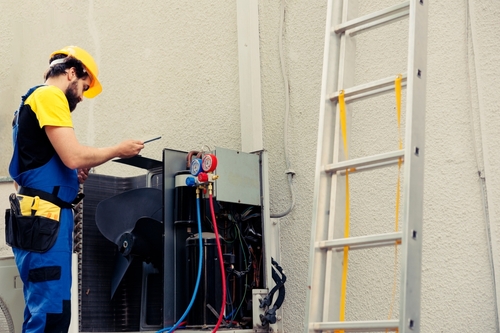May 31, 2024 - Benjamin Ehinger
Make Sure to Hire Licensed, Bonded, and Insured Contractors Only
CALL NOW 844-762-8449
When embarking on a home improvement project, one of the most critical decisions you’ll make is choosing the right contractor. For the protection of your property and finances, it’s imperative to ensure that any contractor you hire is licensed, bonded, and insured. Licensing provides a baseline of industry knowledge and skill, while bonding offers financial protection against incomplete work or non-payment of subcontractors. Importantly, insurance coverage guards against potential liabilities and accidents that could occur on your property during the course of the construction work.
Understanding the distinction and importance of these credentials can shield you from significant risks, including legal liabilities and potential financial losses. A licensed contractor is recognized by state or local government as qualified in their trade; a bonded contractor has secured a surety bond that protects you if the contractor fails to fulfill their contractual obligations; and an insured contractor has coverage that can protect against damages and accidents. While evaluating the credentials and reputation of your contractor, always ask for proof of these protections to verify their legitimacy before any work begins.
 Hiring bonded and insured contractors offers you layers of protection and reassurance throughout the project lifecycle. It is essential to understand how these benefits directly affect the security and quality of your investment.
Hiring bonded and insured contractors offers you layers of protection and reassurance throughout the project lifecycle. It is essential to understand how these benefits directly affect the security and quality of your investment.
 Before hiring a contractor, it’s crucial to validate their licensing, ensure they have a surety bond, and verify their insurance coverage. Additionally, evaluating their business reputation will give you confidence in their ability to deliver quality work.
Before hiring a contractor, it’s crucial to validate their licensing, ensure they have a surety bond, and verify their insurance coverage. Additionally, evaluating their business reputation will give you confidence in their ability to deliver quality work.
Key Takeaways
- Hiring a contractor who is licensed, bonded, and insured minimizes your financial and legal risk.
- Verify the contractor’s credentials to ensure they comply with industry and legal standards.
- Adequate insurance, bonding, and licensing protect you from liability and project mishaps.
Understanding Licensing, Bonding, and Insurance
When hiring contractors, it is essential to ensure they are licensed, bonded, and insured. These elements are foundational to protecting both your property and the contractors’ professional integrity.Importance of Licensing for Contractors
A licensed contractor has met the official requirements set by local or state government entities. To obtain a license, contractors typically undergo a process that includes exams, experience verification, and may involve continuing education. The presence of a contractor’s license confirms that they have the knowledge and capacity to perform work according to industry standards.Role of Bonding in Protecting Homeowners
Bonding provides a financial guarantee that the contractor will comply with the terms specified in a contract. If a contractor fails to fulfill their obligations, a surety bond can compensate you for financial losses. This bond signifies a contractor’s reliability and commitment to ethical business practices.Types of Insurance for Contractors
Insurance is crucial for any contractor as it offers protection against various work-related risks:- Liability insurance safeguards against claims of property damage or bodily injury caused by the contractor.
- Workers’ compensation insurance is essential to cover medical costs and lost wages if the contractor’s employees are injured while working on your project.
- General liability insurance is a wider form of coverage that further protects against the unforeseen incidents that could occur during construction.
The Benefits of Hiring Bonded and Insured Contractors
 Hiring bonded and insured contractors offers you layers of protection and reassurance throughout the project lifecycle. It is essential to understand how these benefits directly affect the security and quality of your investment.
Hiring bonded and insured contractors offers you layers of protection and reassurance throughout the project lifecycle. It is essential to understand how these benefits directly affect the security and quality of your investment.
Protection from Damages and Financial Loss
When you hire contractors who are bonded and insured, you’re protected against potential damages and financial loss. A bond serves as a safeguard that can cover monetary compensation if the contractor fails to complete the job or doesn’t meet the contractual obligations. Liability insurance, on the other hand, ensures that you’re not held financially responsible for accidents or damages to your property. If a claim arises during the project, it will typically be handled by the contractor’s insurance, saving you from the burden of unexpected costs.Ensuring Quality and Compliance
Contractors who are licensed, bonded, and insured tend to adhere to higher standards of quality and compliance with local regulations. By being bonded, contractors demonstrate their commitment to fulfilling contractual requirements. A license indicates they’ve met the industry standards for performing their work. This combination offers a degree of assurance that the work done on your property will meet building codes and regulations, which is imperative for both safety and the future value of your home.Providing Peace of Mind for Homeowners
Above all, the greatest benefit you receive is peace of mind. Knowing that the workers in your home are insured protects you in case of injuries on your property, as their insurance should cover workers’ compensation claims. This means that in the unlikely event of an accident, you won’t be facing liability for any injuries sustained by the workers. Furthermore, the assurance that you’re working with a credible contractor who is licensed and bonded gives you the confidence that your project is in capable hands. By ensuring these protections are in place, you’re making a wise choice for your property and financial wellbeing. As you embark on your next home improvement project, remember that hiring licensed, bonded, and insured contractors is a crucial step in safeguarding your investment.Evaluating Contractor Credentials and Reputation
 Before hiring a contractor, it’s crucial to validate their licensing, ensure they have a surety bond, and verify their insurance coverage. Additionally, evaluating their business reputation will give you confidence in their ability to deliver quality work.
Before hiring a contractor, it’s crucial to validate their licensing, ensure they have a surety bond, and verify their insurance coverage. Additionally, evaluating their business reputation will give you confidence in their ability to deliver quality work.
Verifying Contractor Licensing and Bond Information
To confirm that a contractor is legally permitted to work in your area, you must check their license. Each state has its own database where license numbers can be verified for validity. For example, steps to verify contractors might include accessing state websites or contacting local licensing boards directly. Ensuring the contractor has a surety bond is critical for your financial protection. A bond number should be provided, which you can cross-reference with the bonding company’s records. This bond safeguards you by providing recourse in the event of the contractor’s default on the agreement.Assessing Insurance and Business Practices
A contractor should have comprehensive insurance coverage, including liability and workers’ compensation. Confirm this by asking for proof of insurance and then contacting the insurance provider to validate the details. This step is vital to protect you from potential liabilities during the project. To gauge a contractor’s reputation, look for testimonials and references from previous clients. A reputable contractor will have a list of clients who can vouch for their workmanship and reliability. Consider checking their standing with the Better Business Bureau for additional assurance. By thoroughly assessing these facets before hiring, you guard your project against various risks associated with unverified contractors.Legal and Financial Considerations
When hiring contractors for your project, you must prioritize legal security and financial protection. This involves ensuring they are licensed, bonded, and insured to safeguard against liability issues, accidents, and potentially dishonest practices.Understanding Liability and Accident Coverage
Liability Insurance: It’s important for your contractor to carry liability insurance, which serves as your safety net. If property damage or injuries occur on-site, liability insurance will typically cover the associated costs, preventing you from financial burdens. For example, if a subcontractor accidentally damages a wall, the contractor’s insurance should cover the repairs. Subcontractors also need to be insured to mitigate your risk. Always confirm that any subcontractors brought onto your property carry their own insurance policies; otherwise, you might be liable for accidents they cause. When reviewing insurance, look specifically for:- Coverage amounts
- Policy exclusions
- Valid through dates
Avoiding Fraudulent and Dishonest Contractors
Beware of Fraudulent and Dishonest Practices: Hiring a contractor without proper licensing could lead to fraudulent activity and subpar workmanship. A valid contractor’s license indicates adherence to industry standards and state or local regulations, reducing the risk of fraud. Moreover, licensed contractors are likelier to resolve issues, such as theft or incomplete work, which could otherwise leave you responsible for additional legal fees and losses.- Always verify the contractor’s license number with your local licensing authority.
- Request proof of bond, which protects you if the contractor fails to fulfill the contract terms.
- Check references and past work to assess reliability and quality.
Frequently Asked Questions
When hiring a contractor, it is crucial to ensure they meet all legal operating standards for your safety and financial protection.What are the steps to verify a contractor’s license and insurance coverage?
To verify a contractor’s license, request their license number and check it with your state’s licensing board. For insurance coverage, ask for a Certificate of Insurance (COI) and verify its validity directly with the insurance company.What distinguishes a bonded contractor from an insured contractor?
A bonded contractor provides a financial guarantee to their client through a surety bond, ensuring project completion and compliance with the contract terms. In contrast, an insured contractor is protected against liability claims for injuries or damages that occur during the project.Why is it important to hire a contractor who is licensed, bonded, and insured?
Hiring a contractor who is licensed, bonded, and insured safeguards your investment. Licensing proves competency, bonding protects against incomplete work, and insurance covers accidents or damage.How can you become a bonded contractor, and what are the requirements?
To become a bonded contractor, you must purchase a surety bond from a bonding company. Requirements typically include a completed application, credit check, and may also require financial statements or proof of experience.What specific coverages should be included in a contractor’s insurance policy?
A comprehensive contractor’s insurance policy should include general liability coverage, workers’ compensation, and property damage insurance. It may also cover vehicles and professional liability.What consequences can arise from hiring an unlicensed or uninsured contractor?
Hiring an unlicensed or uninsured contractor can result in inadequate work, legal issues, financial loss due to injuries or damages not covered by insurance, and even fines for violating local laws.RECENT BLOGS
Our Reviews
Glenda Lanier Prowell
1721758635
I have ordered an 11 yard dumpster to be delivered to my house.Lonier was extremely helpful and answered all my questions. The rate was very reasonable.
Cedric Smikle
1721660395
Amber was extremely professional and courteous. She answered all of my questions and even some that I didn’t know I needed to ask.
Cait Kaider
1721243051
I highly recommend Waste Removal USA for their responsiveness and how the staff work hard to provide exceptional customer service. They have done well by us and our clients. Thank you!
Easom Family
1721223306
Louiner Pierre-Louis Is awesome! Did a great job. Will definitely be using this same company for all my dumpster needs because of his awesome customer service! Thank you!!!
tabitha Vazquez
1720539988
Wonderful and fast customer service!
LATEST BLOGS






